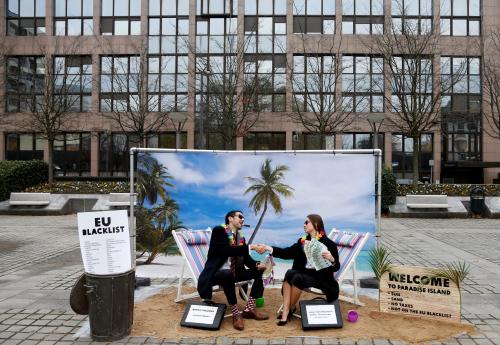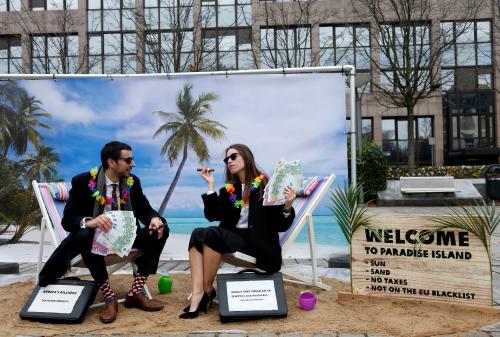This interview is adapted from a segment in the Brookings Cafeteria podcast called “Coffee Break,” where a scholar new to Brookings introduces their background, research interests, and offers book recommendations. The transcript has been slightly edited from the audio recording.
 I’m Matt Collin, I’m a David M. Rubenstein Fellow in the Global Economy and Development program at Brookings.
I’m Matt Collin, I’m a David M. Rubenstein Fellow in the Global Economy and Development program at Brookings.
Q: Where did you grow up?
I was born in the United Kingdom, but when I was only a few months old my parents moved to the small town of Conway, South Carolina, so I grew up in Conway. But, because my mother’s side of family is from the UK, we were going back and forth quite a lot. That is why I somehow come out of the whole thing not sounding quite like I’m from Conway or from the UK at the same time. So, I spent my first 20 years in South Carolina, growing up and going to undergrad at Clemson.
Q: What inspired you to become a scholar?
When I look back and think about why I became a scholar it’s very difficult to pin down that precise moment. And these things tend to be a lot more random than we often like to think about them.
To give you one example of the year when I decided to do a Ph.D., I applied to do a Ph.D., but I was so uncertain about the whole thing that I applied to go film school. I didn’t get into film school, and I got a full ride to go do a Ph.D. in economics. So sometimes it feels like chance pushes you in a different direction.
But I think there’s two things that nudged me toward being a scholar that works on issues of international development. The first are my parents. As I said, I grew up in Conway, where my dad taught international politics and my mom was a nurse practitioner caring for mainly poor patients from the community. From dad, I got the sense that there’s a wider world outside of Clemson.
At the time, I was studying mathematics because I liked to work on problems that had a solution. But most of the things that I’ve worked on didn’t really have much applicability to the rest of the world. Dad would pull me into his own workplace saying things like “could you explain the United Nations Development Program’s population tables to me? Could you explain the Gini index to me?” (which is a popular measure of inequality).
Through that I began to become interested in issues of the outside world, particularly those related to poverty. And when I got to college, I started to study economics and so I realized that there was a way to use the math-y side of my brain and start applying it to real world issues.
[related]The second kind of formative moment was when, after grad school in development economics, I went to work as a civil servant in the Ministry of Finance in Malawi, in southern Africa. This is a program that’s run by a think tank called the Overseas Development Institute that sends young economists off to work in developing countries as civil servants.
I was there for two years and working for the Malawian government really gave me both a sense for how governments in these places can function and how they can sometimes dysfunction. But also, Malawi was a very aid-dependent country at the time. In many ways, we were beholden to international donors, which were providing a lot of the national budget. And it began to open my eyes about the fact that for a lot of these countries, while their own decisions about policy make a huge difference for their ability to fight poverty, a lot of those decisions were made outside of their own borders.
And that began to clue me into other issues, like climate change, migration, trade policy—things that affect developing countries—but are sometimes outside of their control. So, with that experience in mind, that began to become more of a focus in my own work after I received my Ph.D. and started working in a think tank space.
Q: What do you think is the most important issue we are facing today?
If I’m being honest the most important issue we’re facing today is probably climate change, which makes it awkward that I don’t work at all on climate change.
For me, it’s always been a question of finding ways to reduce poverty and inequality. Despite the fact that we’ve made a lot of progress in reducing poverty over the last 30, 40 years, the bar is very rightly going to be moved up in terms of what level of poverty we care about. I see climate change as probably being one of the bigger threats to reducing poverty in the future. But I don’t think that there’s one thing that we should always be focused on.
I think climate change and migration are two of the biggest levers through which we have to worry about poverty in the future. In my case, I worry a lot about how we get the rules of an international economic system right in order to make it easier for poorer countries to pull themselves out of poverty. So, I think it’s less about there being one particular thing we should all be focused on and instead different fronts that we need to be fighting.
Q: What are you working on right now?
During my time here at Brookings I am largely focused on thinking about where people stash money that they’re trying to hide from tax authorities or from their own governments. There’s a broad umbrella of research around something called “illicit financial flows.” This is a big bucket of stuff that includes money laundering, cross-border tax evasion, proceeds of drugs, as well as terrorist financing.
So, my work kind of focuses on two things. We’re trying to make it harder for people to keep money in the Cayman Islands or to move the proceeds of corruption without being detected. So, one is trying to determine if the institutions and policies we’re putting in place to try and reduce illicit financial flows are making a difference. Just recently a story broke about Isabel dos Santos, the daughter of the former president of Angola. Documents have been leaked that show that she had a massive network of offshore companies used possibly to launder money that she made off of her connections to the Angolan government. These companies were running in largely rich countries with very strong anti-laundering institutions. So, trying to get a sense of if these policies are actually effective is a large part of what I try to do.
It’s a difficult thing because, unfortunately, money launderers don’t respond to the surveys that we send out. So, you’re trying to measure something that, by its very nature, wants to stay hidden. Some of the work that I do with my co-authors is to look at recent leaks of information and try to see when we have a leak of data that involves a big money laundering scheme, like the one that happened with the dos Santos case. We also assess if the people running that scheme seem to be reacting to new policies coming into place in different jurisdictions. So, if the Cayman Islands started sharing more information with the United Kingdom, do we see money laundering operations linked to the UK move out of the Cayman Islands for fear of being detected?
That’s one part of it, figuring out whether-or-not these policies are effective. The second part is trying to better understand what some of the costs of these policies might be. If regulators tighten the screws on banks and ask them to work harder to make sure that they’re not facilitating the movement of dirty money, banks often very rationally try and do this in the least costly way possible. Sometimes they’re going to make a choice to continue doing business with clients that are going to make them a lot of money and to do less business with clients who are not going to make them a lot of money. This often means that clients from poorer countries, ones that don’t often have huge revenue implications for banks, may be more at risk of being de-banked because of rising costs.
With a couple of co-authors from the UK, we’re working on updating a study that looks at the changes in payment flows going to developing countries when they are put on a high-risk list by regulators vis-à-vis money laundering and terrorist financing. And we’re finding significant effects, and so it’s less about saying that these policies shouldn’t be put in place and more about just accounting for what actual costs are.
Q: If you could recommend any book for our listeners, what would it be?
One of the books I enjoyed the most over the last decade or so was Jason Stearns’ Dancing in the Glory of Monsters. It’s a very readable account of the first and second Congolese wars which took place in the late ’90s up until the beginning of the 2000s. And it does a very good job at mapping out not only elements that led to those wars, but also all the different players that are involved, not just the Congolese, but the Rwandans and Ugandans, and other neighbors of Congo.
The reason why I like to recommend this book to people right now in my profession and those that work in development is there seems to be a little bit of an implicit agreement that there is a trade-off in some countries between progress in the sphere of development—some improving people’s welfare, increasing life expectancy, improving education—and in their rights.
There are a number of countries, especially in sub-Saharan Africa—Ethiopia maybe until most recently, but also especially Rwanda—where they’ve been making great strides in improving people’s well-being. But these same administrators, these same governments, are curbing the right to free speech, the right to participate in a normal democracy.
I think most people have made the calculation that it’s a trade-off, at least for now, that’s worth making. But they’re often making that calculation just with respect to those countries. What Stearns’ book reveals is Rwanda was hugely implicated in the start and duration of both the first and second Congolese wars, wars that led to the deaths of millions and millions of people.
Rwanda had a very good reason to be involved: it was reeling from a very recent genocide and they wanted to make sure it never happened again. But even as late as 2012, Rwanda was implicated in a lot of violence that was happening just across its borders.
So, I think when people do the accounting to say we’re okay with development and progress, we’re okay with these costs in terms of freedoms, they also need to be including the costs that are being incurred by people in the DRC just across the border. And I think the book is a nice illustration of that.


Commentary
Meet Matt Collin, David M. Rubenstein Fellow in Global Economy and Development
July 13, 2020